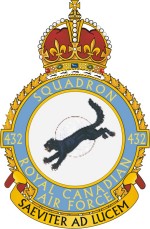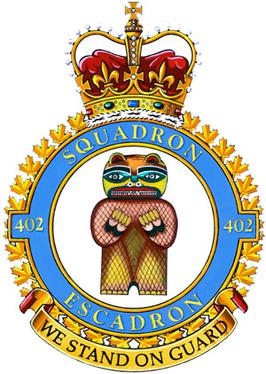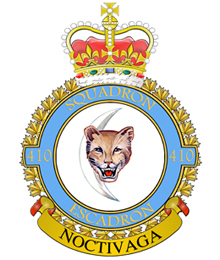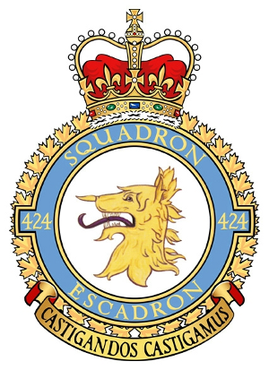
The Bristol Type 156 Beaufighter is a British multi-role aircraft developed during the Second World War by the Bristol Aeroplane Company. It was originally conceived as a heavy fighter variant of the Bristol Beaufort torpedo bomber. The Beaufighter proved to be an effective night fighter, which came into service with the Royal Air Force (RAF) during the Battle of Britain, its large size allowing it to carry heavy armament and early airborne interception radar without major performance penalties.

Shearwater Heliport, formerly known as Canadian Forces Base Shearwater and commonly referred to as CFB Shearwater and formerly named HMCS Shearwater, is a Canadian Forces facility located 4.5 nautical miles east southeast of Shearwater, Nova Scotia, on the eastern shore of Halifax Harbour in the Halifax Regional Municipality. Following a base rationalization program in the mid-1990s, the Canadian Forces closed CFB Shearwater as a separate Canadian Forces base and realigned the property's various facilities into CFB Halifax. These include:

Canadian Forces Base Greenwood, or CFB Greenwood, is a Canadian Forces Base located 1.5 nautical miles east of Greenwood, Nova Scotia. It is primarily operated as an air force base by the Royal Canadian Air Force and is one of two bases in the country using the CP-140 Aurora and CP-140A Arcturus anti-submarine/maritime patrol and surveillance aircraft. Its primary RCAF lodger unit is 14 Wing, commonly referred to as 14 Wing Greenwood.

438 "City of Montreal" Tactical Helicopter Squadron is a unit of the Royal Canadian Air Force. The squadron operates the Bell CH-146 Griffon tactical helicopter from the Hartland de Montarville Molson Hangar of CFB St. Hubert in Quebec, Canada. Its tasks include armed and unarmed tactical utility transport, training aircrew personnel in basic and advanced aviation tactics, technical training of groundcrew personnel and flight engineers and the periodic maintenance of CH-146 fleet aircraft. They also include as residual capabilities search and rescue, reconnaissance and support to federal, provincial and local law enforcement agencies. A "total force" unit composed of members of the Regular Force, and both full time and part time reservists, the squadron is part of 1 Wing at CFB Kingston Ontario.

No. 432 Squadron RCAF was a squadron of the Royal Canadian Air Force formed during the Second World War.

419 Tactical Fighter Training Squadron is a unit of the Royal Canadian Air Force. The squadron was originally formed during the Second World War and is currently based at CFB Cold Lake. It is responsible for advanced tactical fighter training for pilots of the RCAF and as part of the NATO Flying Training in Canada (NFTC) program using nine CT-155 Hawk trainers.

409 Tactical Fighter Squadron is a unit of the Royal Canadian Air Force. The squadron operates the CF-18 Hornet from CFB Cold Lake in Alberta, Canada.

434 Operational Test and Evaluation Squadron is a Royal Canadian Air Force bomber squadron that flew bombing operations over Europe during World War II and was later a post-war fighter and combat support unit. It was disbanded in 2000. The squadron was reactivated in May 2018 as 434 Operational Test and Evaluation.

402 "City of Winnipeg" Squadron is a Royal Canadian Air Force squadron based in Winnipeg, Manitoba, Canada

404 Long Range Patrol and Training Squadron is a long range patrol and training squadron in the Royal Canadian Air Force. The squadron was originally No. 404 Squadron of the Royal Canadian Air Force (RCAF) and later the Canadian Forces Air Command.

403 "City of Calgary" (Helicopter) Operational Training Squadron is a squadron of the Royal Canadian Air Force (RCAF) located at Canadian Forces Base Gagetown. It is equipped with CH-146 Griffons and provides operational aircrew training to the crews who will fly the helicopter. The squadron also conducts operational test and evaluation, develops aviation tactics and carries out operations in support of the 1 Wing mission. It also supports the local Army requirements of the Combat Training Centre. It was founded as No. 403 Squadron RCAF.

No. 428 Squadron RCAF, also known as 428 Bomber Squadron, and 428 Ghost Squadron, was first a night bomber squadron of the Royal Canadian Air Force engaged in strategic bombing during World War II, based in Yorkshire. At the end of the war the squadron moved to Nova Scotia before being disbanded in September 1945. In 1954 the squadron was reformed as 428 All-Weather (Fighter) Squadron, before being again disbanded in 1961.

410 Tactical Fighter Operational Training Squadron, nicknamed the "Cougars", is a Royal Canadian Air Force aircraft squadron currently located at Canada's primary training base for the CF-18, at Cold Lake, Alberta. The squadron was formed during the Second World War as an RCAF squadron under the Royal Air Force (RAF), at RAF Ayr, near Prestwick, in Scotland.

426 Transport Training Squadron is a unit of the Canadian Forces under Royal Canadian Air Force, located at CFB Trenton in Trenton, Ontario. It originated as a squadron in the Royal Canadian Air Force (RCAF) that fought during the Second World War as a bomber squadron.

424 Transport and Rescue Squadron, nicknamed "Tiger Squadron", is a Royal Canadian Air Force strategic transport and search and rescue unit based at Canadian Forces Base (CFB) Trenton in the Canadian province of Ontario. The squadron is the primary provider of search and rescue response for the Trenton Search and Rescue Region, which extends from Quebec City to the Rocky Mountains, and from the Canada–United States border to the North Pole, covering an area of over ten million square kilometres in Central, Western, and Northern Canada.

425 Tactical Fighter Squadron (French: 425e Escadron d'appui tactique, also "Alouette" Squadron, is a unit of the Royal Canadian Air Force. It operates CF-18 Hornet fighter jets from CFB Bagotville in Quebec, Canada. The squadron was originally formed during the Second World War.

Royal Air Force Thorney Island, or more simply RAF Thorney Island, is a former Royal Air Force station located on Thorney Island, West Sussex, England, 6.6 miles (10.6 km) west of Chichester and 7.1 miles (11.4 km) east of Portsmouth, Hampshire.

443 Maritime Helicopter Squadron is a Canadian Armed Forces helicopter squadron under the Royal Canadian Air Force (RCAF), located on Vancouver Island, British Columbia. It was originally a Second World War RCAF squadron that operated as part of RAF Fighter Command in Europe with the Supermarine Spitfire.

440 Transport Squadron is a unit of the Canadian Armed Forces under the Royal Canadian Air Force. It is part of 8 Wing and works closely with Joint Task Force (North) in Yellowknife, Northwest Territories.



















